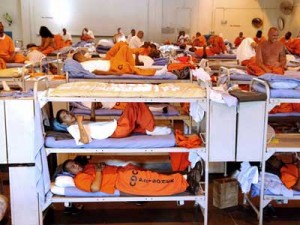New ballot initiative: The Three Strikes Reform Act of 2012

A new ballot initiative, painstakingly written by a pair of Stanford University law professors, seeks to reform the Three Strikes Law in California by restoring it to its original intent, which supporters argue was to keep truly dangerous criminals like murderers and rapists in prison for life without forcing non-violent offenders to spend years behind bars.
The Three Strikes law was enacted in California in the mid-1990s at the height of strong public reaction to the brutal murder of two girls. It created a system of much harsher sentences-- including life sentences-- for third time offenders, even if their crimes were non-violent misdemeanors. The result over a decade later is a California prison system overcrowded to the point of crisis. Meanwhile, the inconsistencies allowed by the law have resulted in mind-boggling sentencing disparities. Take the case of this California man:
"In 1995, just one year after Californians enacted the Three Strikes policy, a man named Curtis stole a $2.50 pair of socks. Because he had been convicted of abetting two robberies in 1981 as a 19-year-old, his most recent crime was 'strike three.' Curtis was given a life sentence."
While Curtis got a life sentence for ultimately stealing a pair of socks, the criminal justice system in California gave a different punishment to a man named John who committed a different crime. After sexually assaulting a 13 year old girl in 2000, John Gardner received only six years in prison, and served only five of them before being released on parole. This despite a 2000 probation report containing this conclusion from a psychiatrist: that John Gardner had “significant predatory traits toward underage girls and should be kept in prison for as long as possible.” After his release, Gardner would rape and murder two more underage girls. The system had failed to keep them safe.
Under the status quo, justice and public safety have apparently been turned on their head. The system is often too harsh on those who don't deserve it and pose no threat to society, while at the same time being too lenient toward violent offenders who pose a serious and predictable threat to the rest of society and have already committed horrific crimes. It is this inversion of justice that the Three Strikes Reform Act of 2012 (full text here) seeks to remedy. Its authors say it will 1) require murderers, rapists, and child molesters to serve life sentences; 2) require life sentences only when an offender's current conviction is a violent or serious crime; 3) give repeat offenders of misdemeanors like shoplifting twice the normal sentence instead of life; 4) save millions of taxpayer dollars; and 5) prioritize the early release of non-violent criminals over violent ones when necessary to relieve overcrowding.
Depending on how Californians feel about the initiative's specific details, there's a good chance they will be receptive to it. One poll earlier this year found a whopping "74% of all voters want Three Strikes revised so it is less draconian, with more leeway in sentencing allowed, which would leave prisons less crowded."



